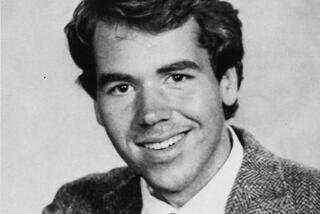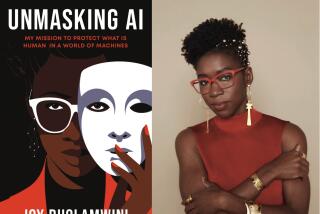Loyalty spoken here
IN 1999, in an attempt to gain recognition for Chicanos and other Latinos who had served in the U.S. armed forces, cultural critic Jorge Mariscal uncovered a lapse in administering the English-proficiency programs in Puerto Rico during the Vietnam War. Because the Army had not complied with its own rules for the testing of non-English-speaking inductees, many of those sent off to Vietnam could barely understand the commands they were given in the field.
To be Latino in this country is to constantly wrestle with language and the baggage of exploitation it carries. With regard to my own Mexican American history: We learned fast that even the signing of the Treaty of Guadalupe Hidalgo in 1848 did not guarantee our right to continue speaking Spanish within the territories ceded to the U.S.
In his thoughtful foreword to “How I Learned English: 55 Accomplished Latinos Recall Lessons in Language and Life,” broadcast journalist Ray Suarez asks the questions we Latinos confront in the “delicate dance between mastery and loss”: “How American am I going to be? Will I still be that other thing -- Puerto Rican, Mexican, Cuban, Peruvian, Honduran?”
Learning English in the United States is never just about learning another language; it is also about learning how to be “American.” The oppositional binary imposed on us (“English Only” or, to use contributor Francisco Goldman’s term, “defiant monolingualism”) prevents our fellow citizens from seeing what most Latinos already know: that we do not need to lose ourselves or our mother tongue in order to speak English or to be as loyal as the Latino citizens who have died in every U.S. war.
Editor Tom Miller has gathered contributions from novelists, journalists, musicians, performance artists, physicians, athletes, entertainers, businessmen. (Some are acquaintances of mine; even if that were not the case, I would still deem this book essential reading.) He also gives us a representational chunk of “that other thing”: entries from natives of 11 Central and South American countries, three Caribbean islands -- including Cuba, which has the largest number of entries in the collection -- and, of course, Mexico. Ironically, a few of the contributions are translated from the Spanish.
The result is a wide range of remembered English lessons, some of which are comical: Poet José Kozer advises that instead of using “beach” (which sounds too much like “bitch”), “I would say ‘shore.’ ” Others offer practical advice, such as to carry a pocket dictionary, or to ask “older people who [don’t] seem in a hurry” for directions. Some can be heartbreaking, as in the case of physician and poet Rafael Campo, who felt he had to “unlearn” Spanish to “finally leave Cuba behind and become truly American.”
English is a language of power and competition -- “the language for bank transactions,” writes author Rubén Martínez, “to address men in suits.” Anthropologist Ruth Behar and writer Richard Rodriguez speak of its necessity in the public sphere. Poet and translator Liliana Valenzuela, who grew up in Mexico City before moving to the United States, writes of learning to value “one language over another -- I was aware of the prominence that English held in our lives as the door to ‘progress’: education, jobs, travel, opportunities, college, popular books, textbooks, and the world at large.”
A good number of these accounts demonstrate the extended, muscular reach of U.S. culture. The books of William Faulkner and Ernest Hemingway, time and time again, introduced English to those ready for the lessons. English was learned from pop singers (Ella Fitzgerald, Frank Sinatra, Van Halen, Cyndi Lauper); from cinema (the classic Hollywood movies of the 1930s to the 1950s that were subtitled instead of dubbed); from television cartoons, children’s shows, soap operas and sitcoms.
No television program, it seems, had a greater impact on the Latino psyche -- especially of Cuban Americans -- than “I Love Lucy.” In H.G. Carrillo’s vividly rendered essay (again, full disclosure: He’s a former student of mine), we’re told that his mother and her sisters are so burnt out by the character of Ricky Ricardo, their representative by default, that they have begun to refer to the show as “I Hate Lucy.”
Some of the essays in the collection are thoughtful, extended pieces of writing; by contrast, many are vignettes or anecdotes, sometimes too short to even begin to express the full complexity of this linguistic/cultural experience. And frequently the sentiments overlap. Still, Miller’s contributors recall their struggle to learn English with both humor and pathos, providing instruction and inspiration for those who find themselves divided -- losing ground, perhaps, but not themselves.
More to Read
Sign up for our Book Club newsletter
Get the latest news, events and more from the Los Angeles Times Book Club, and help us get L.A. reading and talking.
You may occasionally receive promotional content from the Los Angeles Times.






